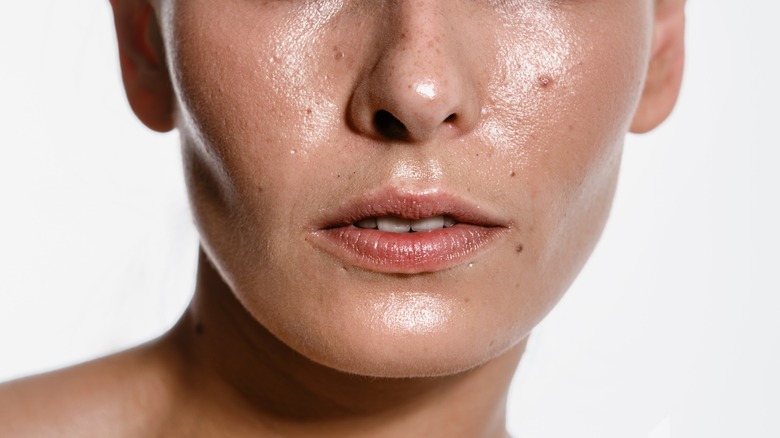A Cosmetic Surgeon's Best Recommendations For Taking Care Of Oily Skin
When it comes to our skin, we all play the role of the devoted servant. Whether it craves more water, better sleep, fancy serums, or a cheese-free diet — whatever our skin wants, our skin gets. And we're happy to do it because we love our skin! But finding the right skin care regimen for your particular skin type can be a rather frustrating game of trial and error that can leave you feeling like your affections have been rejected.
The American Academy of Dermatology Association recognizes five main skin types: normal, sensitive, dry, oily, and combination. Several factors are taken into consideration when determining what skin type you have, including hydration levels, sensitivity, and the amount of sebaceous secretion your skin produces (per Almirall). And because each skin type requires different methods of care, knowing what type of skin you have is the key to healthy, balanced skin.
If you have an oily skin type and often find yourself explaining to the universe that when you said you wanted to look like a snack, you didn't mean a hot and buttery Texas Roadhouse roll, you're not alone. In an exclusive interview with Health Digest, Dr. Michael Horn, a Chicago Board-Certified Plastic Surgeon, gives us his expert tips on how to best care for oily skin so that you can stay looking and feeling your best.
Why does oily skin happen and what does it look like?
While dry skin can often look dull, flaky, and dehydrated, Dr. Horn explains that for people with an oily skin type, the exact opposite happens. "Oily skin is [a result of] excess oil that appears on the face, giving off a greasy or shiny appearance," he explains. "This occurs when the sebaceous glands produce too much sebum. Sebum is a substance that our body has to protect and hydrate our skin."
According to Healthline, sebaceous glands cover the majority of our body, with the face having around 900 sebaceous glands per square centimeter of skin. The amount of sebum our skin produces can be influenced by our genetics, varying levels of hormone production, and different environmental factors like the products we use (per Healthline).
So how do you know if you have an oily skin type? "Signs of oily skin include large pores, pimples, blackheads, or a shiny appearance on the skin," says Dr. Horn. For that reason, he has several recommendations for products to steer clear of if you have oily skin. "Avoid using products with oils in them, such as petroleum and petrolatum, because this is linked to clogged pores," he says. Other products he says to avoid include those containing coconut oil, petroleum jelly, or silicones like dimethicone.
How to care for oily skin and what products work best
When it comes to oily skin, Dr. Horn explains that it just needs a little TLC. "Washing your face every day and night is essential," he asserts. "This removes the residue that builds up throughout the day." To get the best results, Dr. Horn says to pat the skin with warm water and an appropriate cleanser. Products with salicylic acid or benzoyl peroxide help dissolve oil, clear pores, and prevent new breakouts. Try Cetaphil Pro-Oil Removing Foam Wash or Aveeno Clear Complexion Foaming Cleanser.
Once your face is squeaky clean, Dr. Horn suggests applying a toner like Acne Free Witch Hazel Mattifying Toner. "If you're prone to acne, use benzoyl peroxide or sulfur; this will help to reduce oil. Then, in the evening time, use a retinol product." He also says that exfoliation is crucial. "Exfoliate two times a week before bed to help remove the dead skin cells. But remember not to over-exfoliate or skin can become irritated." He recommends Glytone Acne Treatment Mask.
What about moisturizer? "Using moisturizers may seem counterproductive when trying to get rid of oily skin, but often, moisturizers are meant for acne-prone skin," Dr. Horn notes. And don't forget the sunscreen! "Apply SPF 30 or higher every morning, even if it's not bright and sunny outside," he says — but be sure to use a non-comedogenic sunscreen.
To hear more from Dr. Michael Horn, visit his website or follow him on Instagram.



